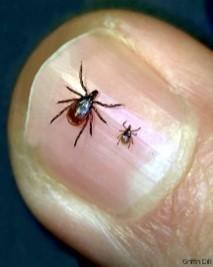Protect Yourself and Your Family from Ticks

The Melrose Health and Human Services Department would like to remind residents of the importance of protecting themselves and their family from tick bites as we spend more time outdoors in warmer weather. A common misconception is that ticks are only in wooded areas, when in fact they can be found in our backyards.
Deer Ticks VS Dog Ticks
Although not every tick carries a disease, it is important to take steps to avoid all tick bites to prevent tick-borne diseases.
Deer Tick bites can cause Lyme disease and other serious diseases that can result in long term side effects. Adult Deer Ticks are about the size of a sesame seed and young ticks (nymphs) can be smaller than a poppyseed, Meanwhile, Dog Ticks are about double the size of deer ticks and can be spotted more quickly on the skin. Dog Ticks do not carry Lyme disease but can carry other serious diseases. Both species of ticks will look much larger when engorged. Ticks are mostly found behind knees, armpits, the waist, or near areas with hair. Tick activity and tick-borne diseases are most diagnosed in children and older adults.
There are Two Peak Tick Seasons
Although tick activity is year-round and weather-dependent, there are two peaks during the year; the first begins in early spring and lasts through August, and the second occurs in October-November.
How to Prevent Tick Bites
- Use insect repellents that contain an EPA-registered active ingredient like permethrin or DEET.
- Wear light-colored clothing to more easily spot ticks. Wear long pants, long sleeves, and socks to reduce exposed skin, and a hat to protect your scalp. Tuck pant legs into socks if walking in areas with tall grass.
- Check yourself, your children and pets, soon after being outdoors.
How to Remove a Tick & Treat
Find a tick attached to your skin?
- Remove it promptly.
- Use fine tipped tweezers and grip close to the skin. Pull upward with steady, even pressure to remove the tick. Avoid twisting or jerking. Do not use nail polish, petroleum jelly or a hot match to make the tick detach.
- Clean the bite area and your hands by rubbing alcohol, or scrub hands with soap and water.
- Call Your Doctor if you see a rash or feel like you have the flu, especially if you have been outdoors, exposed to ticks, or suspect a tick bite within the last two weeks.
For more information, visit www.mass.gov/MosquitosandandTicks or contact Melrose Public Health Nurse Melissa Lowry RN at (781) 979-4130.
